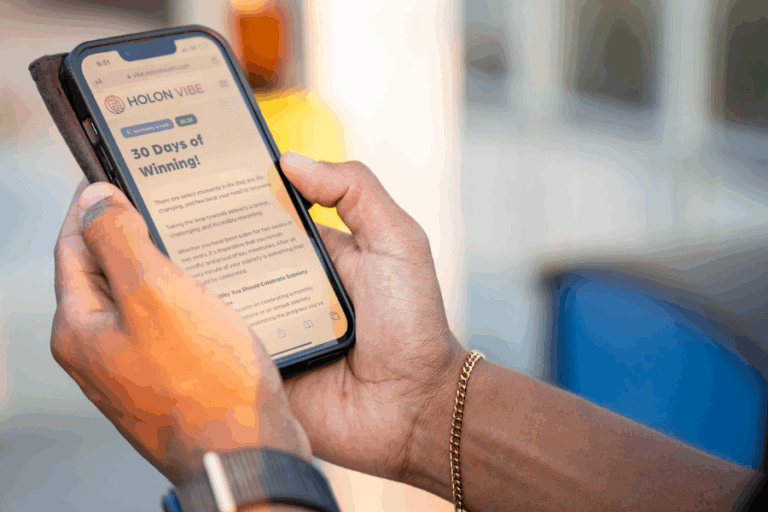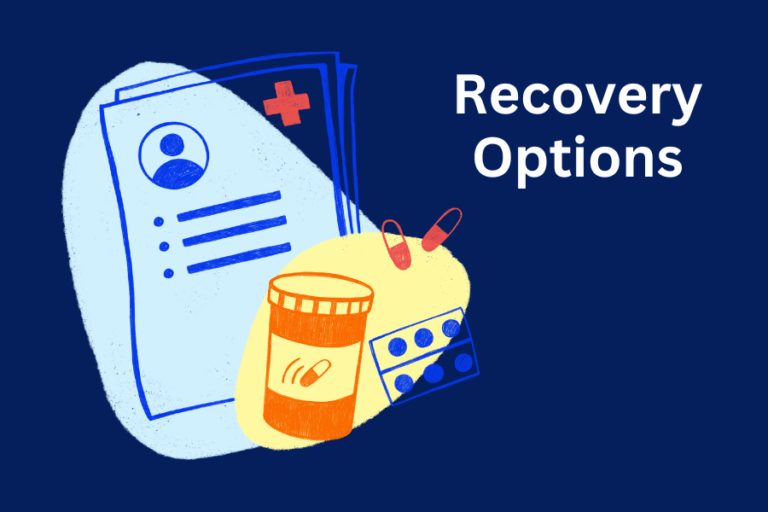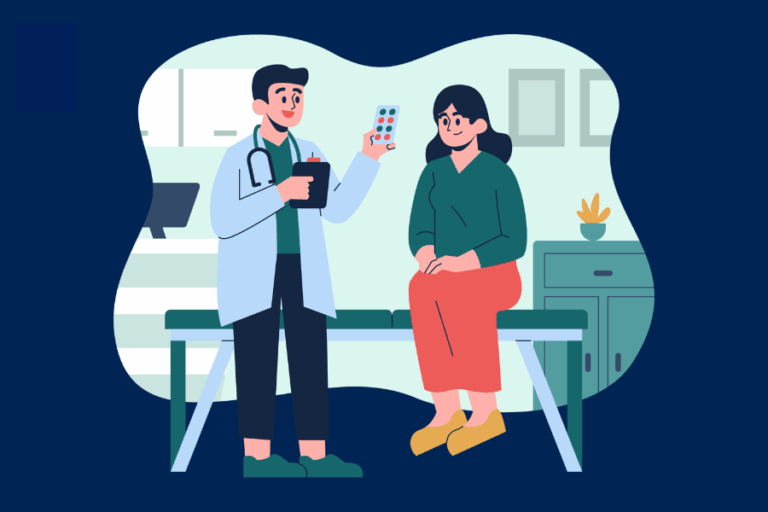Deciding you need help for addiction or substance use disorder is a huge first step towards recovery. Once you’re ready, the next question is, “What kind of treatment is right for me: online treatment or in-person?”
With more recovery options than ever, understanding the differences between online addiction treatment and in-person treatment is critical. This article will help you understand each type of program, walk you through the benefits and limitations, and give you the information needed to make the choice that’s best for you.
What is Online Addiction Treatment?
Online addiction treatment is treatment that is provided virtually through telehealth. It can be completed on a phone, tablet, or laptop in the comfort of your own home. Telehealth enables you to connect with licensed healthcare professionals through secure video calls, phone conversations, and messaging.

Telehealth Options and Recovery Apps
In addition to telehealth treatment services, there are many digital apps that offer structured recovery programs, progress tracking, online meetings, and peer support groups, and even apps (like Holon Vibe) that reward you with cash for completing daily lessons and meeting recovery milestones.
Who’s a Good Fit for Online Treatment?
Telehealth and recovery apps may be a good fit for you if:
- You have a busy schedule or are a caregiver
- You live in an area that is short on resources
- You don’t have the necessary transportation or resources for in-person care
- You’re seeking to integrate treatment into daily life
- You value privacy, anonymity, and prefer discreet treatment from home
Telehealth and recovery apps are not suitable for you if:
- You are experiencing physical withdrawal or a medical emergency
- You are medically compromised due to other health concerns
- You have repeatedly relapsed and could benefit from a higher level of care
If any of the above apply to you, please talk with your provider about your options. If you are experiencing a medical emergency, call 911 or go to your local emergency room.
You may not like online addiction treatment options if:
- You thrive on face-to-face connections since telehealth may feel less personal
- You don’t like using technology and/or you get frustrated by it
- You are seeking in-person group support
Benefits of Online Addiction Treatment
Online addiction treatment has several benefits, including convenience, flexibility, broader access to providers and even specialists, and often, it can be a more immediate solution. Telehealth services are generally more affordable than traditional programs due to the convenience and smaller time commitment that doesn’t involve travel.
Research indicates that telehealth and app-based addiction treatments can be as effective as in-person care for many people. Studies published in JAMA Psychiatry and Addiction Science and Clinical Practice showed equal or even better engagement and recovery outcomes, with digital tools also improving the amount of time people stay in treatment, which is a key predictor of long-term success.
Two Stories of Online Addiction Treatment Success
After completing an inpatient rehab program, Kelly transitioned to a digital recovery app that offered daily therapeutic lessons and support from medical providers and recovery coaches. The daily check-ins, telehealth therapy, and cash she could earn from completing lessons helped her stay motivated and decreased her relapse risk.
Jared, a working professional in early recovery, opted for evening telehealth appointments from a virtual treatment provider. The flexibility allowed him to maintain sobriety without sacrificing his career.
In these examples, online treatment made it easier to maintain progress and adapt recovery to everyday life.
In-Person Addiction Treatment
There are several types of in-person treatment, including detox, inpatient, outpatient, group therapy, and more. What type of in-person treatment all depends on your individual needs and what level of care can best support you in recovery. In general, we look at in-person treatment as a progression. If you start in detox or inpatient, you may progress to a stabilization or partial hospitalization program then an intensive outpatient program and finally, an outpatient program. This progression improves chances of long-term success!
Detox Programs
Those who are currently in or at risk of experiencing withdrawal symptoms need to go to an in-person detox facility to ensure they have the right level or care to manage symptoms and potential complications of withdrawal. A typical detox program lasts between 3-10 days.
Inpatient Treatment
Like detox, inpatient treatment is a great option if you need stabilization following detox but do not need a medically supervised higher level of support. Inpatient treatment options can support you for 30-90 days in most cases, depending on your personal situation.
Partial Hospitalization Programs (PHP)
For those who need a high level of support but are at a lower risk, Partial Hospitalization Programs are often a great fit because they provide some flexibility but maintain a structured day or half-day program and allow you to sleep at home.
Intensive Outpatient Programs (IOP)
For those needing a middle ground of support, Intensive Outpatient Programs can meet that need. IOP programs are usually part-time, mornings or evenings, group-focused, and last 2-3 weeks.
Outpatient Treatment
If you need a lower level of care and are seeking more flexibility, an outpatient program may be for you. Outpatient programs often include medical provider support, therapy and/or peer support, and group sessions in some cases.
Pros and Cons of In-Person Addiction Treatment
Some drawbacks of in-person treatment are the time and travel commitment: you must be able to get there for appointments and stay there for the program duration.
Some benefits of in-person treatment are:
- A higher level of support
- Safe and supportive environment
- Structured care
- Access to in-person providers, peer support, and groups
- A strong community of peers
- Space away from triggers and temptations
Research consistently demonstrates that inpatient and structured outpatient programs reduce relapse risk, especially during the early stages of recovery. Longer treatment stays (90 days or more) are associated with significantly improved long-term outcomes.
Two Stories of In-Person Treatment Success
Jane, a young adult struggling with opioid addiction, entered a short-term detox facility to manage withdrawal symptoms. After 5 days and being medically cleared to discharge, she transitioned to a 30-day rehab stay where the structured setting, professional staff, and group support helped her process her triggers, create a relapse prevention plan, and teach her healthy habits to use when returning home. Once she was ready to return home, she began an IOP program that she enjoyed and found community support.
Dave, a dad struggling with alcohol dependence, attended an intensive outpatient program for 2 weeks. The daily sessions and peer accountability allowed him to progress in his recovery while still being home with his children. He took advantage of the IOP program while waiting for his first appointment with an outpatient therapist.
In both cases, the immersive nature of in-person care provided a strong launchpad for recovery.
How to Decide Which Treatment is Right for You
The right treatment depends on several factors: the severity of your addiction, personal responsibilities, access to support in your community or social circle, financial considerations, and your readiness for change.
A professional assessment can help guide your decision, but personal reflection is equally important. Some questions to help you include:
- Do you need 24/7 medical support or detox?
- Can you realistically maintain recovery while living at home?
- What environment will keep you most motivated and engaged?
For some, in-person treatment offers the stability and structure needed in early sobriety. For others, online treatment provides the accessibility and flexibility to sustain recovery long-term.
Recovery Isn’t One-Size-Fits-All
There is no single right path to recovery that works for everyone. Both in-person and online addiction treatments have distinct benefits, and the best choice depends on you, your individual needs, circumstances, and goals.
In-person programs may provide the intensity and structure necessary to begin recovery, while online options ensure ongoing accessibility and support while remaining at home and in your community.
Holon Health Can Help You Start Recovery
At Holon Health, we specialize in making treatment accessible for you. For those who are seeking online recovery options that work, Holon Health is a great fit. For those who need a higher level of care, Holon can provide digital services and referrals to the level of treatment needed. If you’re ready to start recovery, text/call us at (877) 465-6650 or enroll today. Our services are fully covered by Medicaid, Medicare, and some Marketplace plans.



